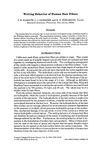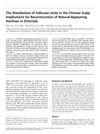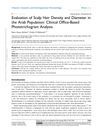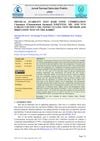June 2023 in “International journal of molecular sciences” Heat stress changes goats' skin and hair at the microscopic level and affects their genes and skin bacteria.
 56 citations,
January 2001 in “Dermatology”
56 citations,
January 2001 in “Dermatology” Teloptosis is a key point in hair loss that could help in creating prevention-focused hair care strategies.
 44 citations,
September 2012 in “Archives of Dermatology”
44 citations,
September 2012 in “Archives of Dermatology” Hair breakage may be an early sign of a hair loss condition called CCCA in African American women.
 24 citations,
September 2014 in “Drug Delivery”
24 citations,
September 2014 in “Drug Delivery” Using microneedles before applying eflornithine cream can make it more effective at stopping hair growth.
 6 citations,
May 2017 in “InTech eBooks”
6 citations,
May 2017 in “InTech eBooks” Hair loss can cause serious mental health problems and treating it requires a team of experts.
4 citations,
February 2015 in “PubMed” The emu oil emulsion with minoxidil was better at promoting hair growth than the commercial product.
 2 citations,
March 2009 in “Hair transplant forum international”
2 citations,
March 2009 in “Hair transplant forum international” Men generally have a certain thickness of hair at their hairline.
 37 citations,
January 2017 in “International Journal of Dermatology”
37 citations,
January 2017 in “International Journal of Dermatology” Trichoscopy helps tell apart alopecia areata and trichotillomania in Asians by looking at specific hair and scalp features.
 17 citations,
November 2018 in “Dermatology”
17 citations,
November 2018 in “Dermatology” Most patients with frontal fibrosing alopecia had facial bumps, with Hispanic/Latino and premenopausal women being more affected, suggesting a more severe condition.
 January 2024 in “http://isrctn.com/”
January 2024 in “http://isrctn.com/” Teak leaf extract hair tonic was tested for hair growth and safety.

The document concludes that understanding hair's composition and the effects of treatments can lead to better hair care products.
 January 2021 in “Journal of Allergy and Therapy”
January 2021 in “Journal of Allergy and Therapy” Electric Follicle Stimulation may promote hair growth and density with no known side effects.
 June 2020 in “Applied sciences”
June 2020 in “Applied sciences” A new semi-automatic hair implanter could make hair transplants easier, more successful, and more accessible.
 236 citations,
July 2001 in “Trends in Molecular Medicine”
236 citations,
July 2001 in “Trends in Molecular Medicine” Future hair loss treatments should aim to extend hair growth, reactivate resting follicles, reverse shrinkage, and possibly create new follicles, with gene therapy showing promise.
 179 citations,
December 2004 in “Journal of The American Academy of Dermatology”
179 citations,
December 2004 in “Journal of The American Academy of Dermatology” Some postmenopausal women with frontal fibrosing alopecia stopped losing hair with finasteride treatment, hinting at a possible hormonal cause.
 52 citations,
August 1978 in “Journal of Applied Polymer Science”
52 citations,
August 1978 in “Journal of Applied Polymer Science” Human hair's ability to get wet is complex and can change with treatments, damage, and environment.
 23 citations,
March 2010 in “Medical hypotheses”
23 citations,
March 2010 in “Medical hypotheses” Merkel cells may have roles in sensing magnetic fields, creating fingerprints, Reiki energy healing, passing on environmental information to offspring, and influencing hair shape.
 17 citations,
June 2002 in “Dermatologic Surgery”
17 citations,
June 2002 in “Dermatologic Surgery” Chinese patients have fewer hair follicles than Caucasians, and transplanting hair at 40% of normal density works for natural-looking hairlines.
 15 citations,
September 1999 in “British Journal of Dermatology”
15 citations,
September 1999 in “British Journal of Dermatology” Epimorphin, a protein, plays a key role in the development of hair follicles in human fetuses, but it doesn't help in maintaining the stem cell population of the follicular skin layer.
 14 citations,
March 2012 in “Lasers in Surgery and Medicine”
14 citations,
March 2012 in “Lasers in Surgery and Medicine” A low-power, fast laser safely reduces hair with minimal pain and few side effects.
 9 citations,
January 1989 in “Sen'i Gakkaishi”
9 citations,
January 1989 in “Sen'i Gakkaishi” Wool and hair fibers absorb moisture similarly due to their keratin structure, with the amount of non-crystalline areas affecting the moisture uptake.
 1 citations,
December 2022 in “Clinical, cosmetic and investigational dermatology”
1 citations,
December 2022 in “Clinical, cosmetic and investigational dermatology” Arab hair is generally thicker but less dense compared to other ethnicities, affecting hair disorder diagnosis and treatment.

GFC injections significantly improved hair growth and quality with minimal side effects.
 June 2024 in “Nature Cell and Science”
June 2024 in “Nature Cell and Science” The Scalp Coverage Scoring method reliably measures hair density from images.
 May 2024 in “Journal of Cosmetic and Laser Therapy”
May 2024 in “Journal of Cosmetic and Laser Therapy” Injectable platelet-rich fibrin improves hair growth and reduces hair loss in women.
 April 2024 in “Clinical dermatology review (Print)”
April 2024 in “Clinical dermatology review (Print)” Most women aged 20-40 in the study lost hair diffusely and in volume over 6 weeks to 6 months, mainly due to telogen effluvium, often without a clear cause.
 December 2023 in “Data in Brief”
December 2023 in “Data in Brief” Curly hair's strength and flexibility vary with moisture and temperature.
 September 2023 in “Skin Research and Technology”
September 2023 in “Skin Research and Technology” The paper suggests a way to diagnose male hair loss and check treatment results using a dermoscope at four specific scalp points.
 May 2023 in “Jurnal farmasi sains dan praktis”
May 2023 in “Jurnal farmasi sains dan praktis” The hair tonic with cinnamon oil and coconut oil was stable and caused very mild irritation.
Hibiscus leaves and apple skin could be effective in hair tonics to prevent hair loss.


























